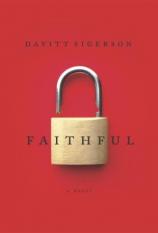Reading Group Guide
Discussion Questions
Faithful: A Novel

1. Discuss the voyeuristic experience of reading this novel. Is sexuality the only intimate aspect of the characters' lives you witness?
2. How might the novel have unfolded with Trish or Nick as the narrator, describing these events from their point of view?
3. Do you consider the novel's depictions of sexuality to be realistic or fantasy?
4. Can you blame Trish's behavior? Do you judge these characters for their actions?
5. Are the novel's characters accurate reflections of human nature, or are they anomalies? Are human instincts conducive to monogamy? Does human nature enhance or hinder our capacity for romantic love?
6. Faithful snubs the notion that a woman loses her sex appeal when she becomes pregnant. In what ways does Trish reinvent the stereotypes of maternity, and of wives in general?
7. What distinctions does Nick observe between British and American culture? How does life overseas help to shape his identity?
8. Is Johnny a masochist, or is she a victim of circumstance? Why doesn't Nick feel as drawn to her as Trish is to her former longtime lover?
9. Discuss the role of Nick's friends in shaping his outlook on life. Why was Koestler the only one to confront Trish directly? Is the lapsed Judaism of Koestler and Nick a significant or inconsequential detail, particularly in terms of the contemporary London society they inhabit?
10. Who are the novel's faithful characters? In what do Trish and Nick place their faith? How did the initial act of infidelity on Trish's part—a twist on the concept of anonymous sex among business travelers—differ from her reunion with Joe? What was her real reason for wanting to leave Nick? What motivated her to marry him?
11. The novel begins and ends with two distinctly different images of domestic bliss. Does Nick travel full circle in Faithful, or will he leave for an altogether new life?
12. On page 104, Maggie makes observations about shopping that reflect the process of looking for love. She tells Trish, "Girls—like you and my darling brother—take your pleasure in the shopping. You delight in testing everything that's possibly available. . . . What matters is not gaining the acquisition but giving up all the choices you didn't take." In your experience, is Maggie correct?
13. What does the novel ultimately say about the nature of attraction? Are power struggles inherent in love? How often does unavailability enhance the appeal of a potential lover?
14. Evan tells Nick that women with adventurous sex drives are too dangerous to marry. What are the converse rumors regarding men?
15. How does the intensity of Faithful's sexuality affect your reading of it? Are the author's candid descriptions of sex integral to the narrative, or are they merely an accessory? Do sex and romantic love coincide in any of the characters' lives?
16. How does Nick's love for Charlotte differ from his love for Trish? Is his paternal devotion typical of most men in his situation? What is the relationship between Trish's and Charlotte's behavior?
17. Although Charlotte is a very young child she has feelings and opinions of her own. How do these influence the behavior of Nick, Trish, and Joe?
18. What do you think Charlotte's role in the novel is?
19. At one point Nick refers to Trish as his dirty habit to kick, as if she were an addictive drug. What other addictions are portrayed in the novel? Do all of them have damaging consequences? What alluring devices did the author appear to use to keep you hooked on the novel?
20. The author has been a songwriter and a leader in the music industry. Did you detect any influences of that career in Faithful?
21. The novel ends with a tantalizing "what if." What do you predict for Nick's future, and Charlotte's?
22. Why is this novel called Faithful? What does the word "faithful" mean to you? We are interested in your responses to this final question.
Faithful: A Novel
- Publication Date: March 16, 2004
- Hardcover: 209 pages
- Publisher: Nan A. Talese
- ISBN-10: 0385510500
- ISBN-13: 9780385510509







